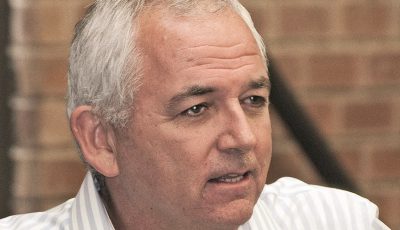

Africa Scene: Rupert Smith
Spinning a Thriller From Corruption
Rupert Smith spent 25 years as a successful corporate lawyer in Johannesburg before joining a coal mining company as part of its senior management. By the time he retired, he knew the mining industry from the inside–how things are supposed to be; how they are presented publicly; and how they actually are.
Most people are content to retire after a long career of hard work and concentrate on Sudoku puzzles (he is an expert), but Rupert decided to share some of his experiences in a novel with a coal mining company as a backstory. STEAL A FEW CENTS was released last year by Roundfire Books and has just had its South African debut. Well-known local author Tim Butcher said it “spins an all too convincing thriller out of a South African setting of veld, mining and corruption.” Butcher has it spot-on for my money.
Mpho Mamela, a young accountant for the coal mine, is found horribly mangled by a massive conveyer belt that transports the coal. He had no reason to be in the area, and what is at first accepted as a tragic accident starts pointing to a homicide as Stephen Wakefield, the in-house lawyer, puts together the case for the inevitable state inquiry. He discovers that Mpho’s lover was jailed for “stealing a few cents,” while Mpho himself seems to be involved with a senior figure stealing a few millions.
I asked Rupert how he came to write his debut novel.
What persuaded you to start writing fiction after retiring from a 30-year career as an attorney? Was it your experiences in the mining industry and the stories you discovered there, or have you always wanted to write?
Attorneys’ documents are confidential and are formatted as “Read Only.” For the majority, they are also “Write Only” — nobody ever reads them. I longed to have somebody, anybody, actually read what I write. So, I turned to fiction. I hope my plan works.
STEAL A FEW CENTS is based on real events that have never been made public. How similar is the book to the true stories and how much is fiction?
The book is a patchwork of things that happened in different places and at different times, fictionally cobbled together. The first incident in the book, when someone is killed on a conveyer belt, is an incident that actually happened—the person was found the next day, very much as I describe. The young man who tried to steal a few cents is also a real story —one that happens over and over, so much so that there is a name for it: “Black Tax.” Often, when a young person from a poor background finally gets a formal job, his entire clan makes demands on his still-limited resources. Because he can’t say no to his family that sacrificed to put him through school and university, he gets into trouble with his bank and, sometimes, with the law. Fraud and theft I saw on an ongoing basis while I was in practice. Bribes paid to Government agencies are, sadly, an everyday occurrence; and sophisticated white-collar fraud, as I describe in the book, is almost a national corporate pastime. So, very little is complete fabrication. Except for the homicide—fortunately the mines I worked at got on better than that.
Stephen Wakefield is a sympathetic protagonist. Reaching the end of his career as a director and in-house attorney for the company, he has the experience and insight to resolve the mystery. There are obvious parallels to yourself. How much of you is in Stephen and how much is pure invention?
The characters in the book are archetypes. They are based on real people, accurate in the aggregate. From the solipsistic CEO, through the officious HR manager to the hard-bitten chief engineer, they all fit into a category which is recognizable when you deal with them. No character in the book is based on one single person, even though there are broad similarities to people I have met during my career. It is like a horoscope—you recognize yourself because of a broad generality of shared characteristics: People born under Aquarius are loyal to their loved ones, and, when the chips are down, will fight for what they think is right. Stephen is like me in that he is married to a nice woman who loves her dogs and cats.
Unlike much contemporary South African crime fiction, STEAL A FEW CENTS doesn’t exploit the New South Africa/Old South Africa dichotomy, but rather focuses on the huge gap between the haves and the have-nots in the country. Is this how you see the mining industry here in the 21st century?
It is how I see the whole country. Old South Africa is historically and contextually relevant, but doesn’t help to put bread on the table. The Free-Borns are less interested in the ghost of slavery’s ship than in having Nike Air Zoom sneakers and an iPhone. We are fast becoming a nation simply of South Africans, albeit with vast inter-personal differences. But those differences are maintained socio-economically, not by pigmentation. You see this clearly in the mining industry, where many of those in charge now are the new, super wealthy, empowered elite. But old black Joe is still picking cotton for their ribbons and bows.
The Chief Executive Officer of the company, Thuli Mpongose, is, perhaps, the exception—always harking back to his poverty-blighted childhood and his struggle to reach the top against the odds. Having got there, he shows off with expensive toys and habits. Is this a pivotal feature of his character?
He has much to complain about: an orphan in a poor household doesn’t sleep on a bed of roses. And, as with so many people who get into powerful positions, he turns the incidents of his childhood into a personal mythology. But he isn’t alone—we have all heard the pompous old man in Monty Python tell how hard his life was when he and his family lived in a rolled-up newspaper in the middle of a lake. Thuli Mpongose fits the archetype—but he has real stuff to moan about. And he doesn’t show off as much as he can. I could have had him eat sushi off a nude model’s stomach.
The victim, Mpho Mamela, develops as a complex character—quite a trick since he’s been murdered before the book opens. He comes to life through the perspectives of the people who knew him—his boss, his priest, his mother, his lover. How did you put this all together?
I wanted him to have credibility, both as a character and as the person who delivers the pay-off line, juxtaposing petty crime and systemic fraud. He tells us that the former is punished while the latter is lavishly entertained. For Mpho to do this believably, he has to be a character of some complexity; and the way in which he comes to his insight must be compelling, both emotionally and intellectually. I set out to describe him as an empathetic idealist, who has his feet firmly on the ground. Because he can’t give any account of himself, having been killed before the book begins, the characters in the book you trust describe him: The adorable priest who knew him well, his boss who thought highly of him, his mother, his lover. They all say different things about him, but the bits meld together into a collage.
STEAL A FEW CENTS reads like a stand-alone. Are you working on further novels, and if so, would you give us an idea of what’s ahead?
I have no plans, but I would like to write about a much-neglected community in South Africa—the people of Indian descent: To Live and Die in Lenasia. Something like that.
- Out of Africa: Annamaria Alfieri by Michael Sears - November 19, 2024
- Africa Scene: Abi Daré by Michael Sears - October 4, 2024
- International Thrills: Fiona Snyckers - April 25, 2024





